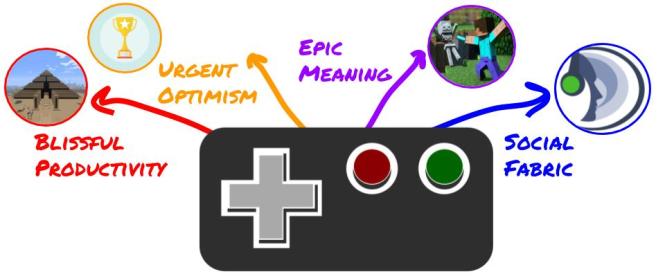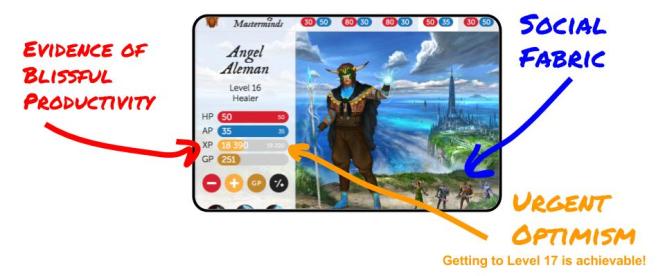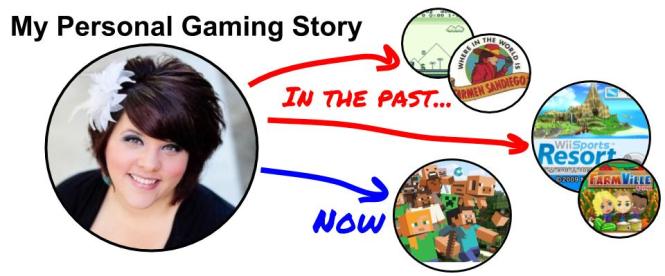|
When I checked 3D Game Lab this morning, I was so excited to see the “Games Can Make the World Better” quest appear in my available lessons! I have long been a fan of Jane McGonigal and this particular TED Talk. In fact, my students even watch this TED talk and complete document-based questioning during our unit on coding! McGonigal makes some solid arguments for the incredible impact that games have our society and the potential of games to create an even larger impact over time. Gaming provides an opportunity to learn skills such as collaboration, creativity, problem-solving, and critical thinking – all of which are embedded in gameplay as opposed to overtly instructed. To further to impact of games, players engage in tangential learning because they enjoy the activity and have a desire to educate themselves on related concepts as a result. McGonigal cites Gladwell’s 10,000 hours theory as evidence that gamers are actually educating themselves on gaming principles to the extent that they are virtuosos. She claims that gamers develop a sense of urgent optimism while fostering a strong social fabric. They engage in high levels of blissful productivity, which in turn contributes to a sense of epic meaning associated with their gameplay. From an educative standpoint, this translates into learners who are high motivated, able to collaborate, persevere through difficult tasks, and make greater connections between themselves and the world. Many of those behaviors are qualities teachers seek to instill as per the CCSS Standards for Mathematical Practice and the Common Core Habits of Mind. Games constantly, consistently acknowledge player progress, which I think plays a big part in making gaming a compelling experience. Gaming interfaces often include earning XP and provide progress bars for monitoring one’s advancement through levels of gameplay. Often, there are also badging systems and/or a way to earn advanced equipment or perks. In some games, a player’s avatar is reflective of their accomplishments in the game, which can provide motivation for players to continue.
In the classroom, we often give immediate feedback during class discussion, but not nearly enough to be truly motivating. Added to that, there is often a pretty hefty turnaround for grading assignments, particularly at the secondary level when teachers have 150+ students. Feedback from teachers might not even be particularly valuable or meaningful to some students, typically those who are not academically oriented. They are not motivated by grades because there is no epic meaning attached. For these students especially, there is no larger academic story to be told, no way to “win” school and therefore fewer reasons to try. Gamification presents a unique opportunity to layer gaming principles over curriculum, as seen in the quest-based lessons we are experiencing in EDTECH 532. Even the use of a tool like Class Craft, where students can customize avatars and earn XP for academic tasks, makes school feel more like a game.
0 Comments
The very first computer game I asked my parents to purchase was Carmen Sandiego. There was a children’s television game show by the same name on PBS at the time, and I never missed an episode. I couldn’t wait to play the game each day! Somehow, I do not remember ever catching up to that elusive Carmen, but I do remember the many happy hours I played. Perhaps it was this game that instilled in me a lifelong fascination with geography and travel. Around the same time, I remember using a GameBoy the size of a brick along with black and white game cartridges featuring the Mario Brothers. Again, I do not remember ever beating the game, but I do remember that the challenge of playing each level left me with a feeling of satisfaction and accomplishment. The thrill of collecting coins and power ups is part of the reason that I have become interested in the gamification of education. I did not play many games through my college years, but as an adult my husband and I purchased a Wii and developed a fascination with WiiSports Resort, which provided hours of entertainment. We also succumbed to the Facebook game craze, playing Farmville for hours on end at our local Panera Bread restaurant since we did not have an Internet provider for a time when we were newlyweds and not yet financially stable.
The advent of mobile devices and pocket games really changed the way I viewed games because I saw them as something that could rescue me from tedious waiting rooms and long lines at the DMV. I began to play Tiny Chef, Bejeweled, and Minecraft using my iPhone. I also discovered Settlers of Catan and a PantherSim for iOS, along with The Walking Dead. The joy of discovery and meaningful stories are the most appealing parts of my favorite mobile games. As a professional, my interest in gaming in education began when I attended several sessions on MinecraftEDU at the CUE Conference in 2015. I was impressed by how content could come alive and tap into student interests in virtual worlds. At the time, the closest thing my district could support was Class Craft, which adds elements of gameplay to my classes. My students assume three different character classes and earn XP for completing tasks. They lose HP for negative behaviors, but I primarily use the game as positive reinforcement over punishment. Now, through my graduate program, I’ve learned how to leverage Minecraft for learning and I am eager to move into the next phase of my gamification journey. My idea is to use 3-D Game Lab to gamify two of my classes: Social Studies and Leadership. I checked out the pricing packages and I thought it was worth it to spring for an educator subscription. While I already utilize Class Craft, Google Classroom, and Weebly to deliver content to my students, I really like how the quests can be unlocked in a certain sequence in 3-D Game Labs. I think that feature alone will make the subscription fee worthwhile. Added to that, I am pursuing acquiring Minecraft-ready devices for classroom. I am determined to integrate Minecraft into every unit for my Social Studies class next year. I am convinced that the learning will be EPIC. |
Author: Jessica PackCalifornia Teacher of the Year. CUE Outstanding Educator 2015. DIGICOM Learning Teacher Consultant. 6th Grade Teacher. Passionate about gamification, Minecraft, digital story-telling, and fostering student voices. Download:Archives
June 2020
Categories
All
|




 RSS Feed
RSS Feed